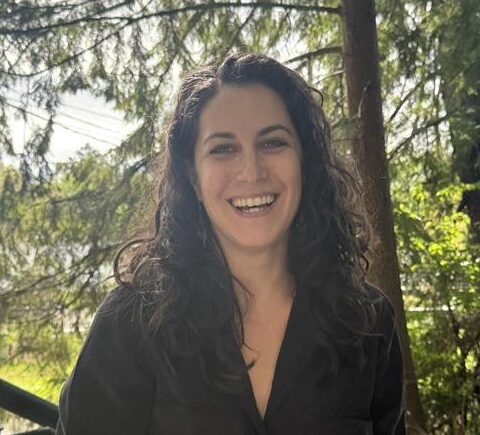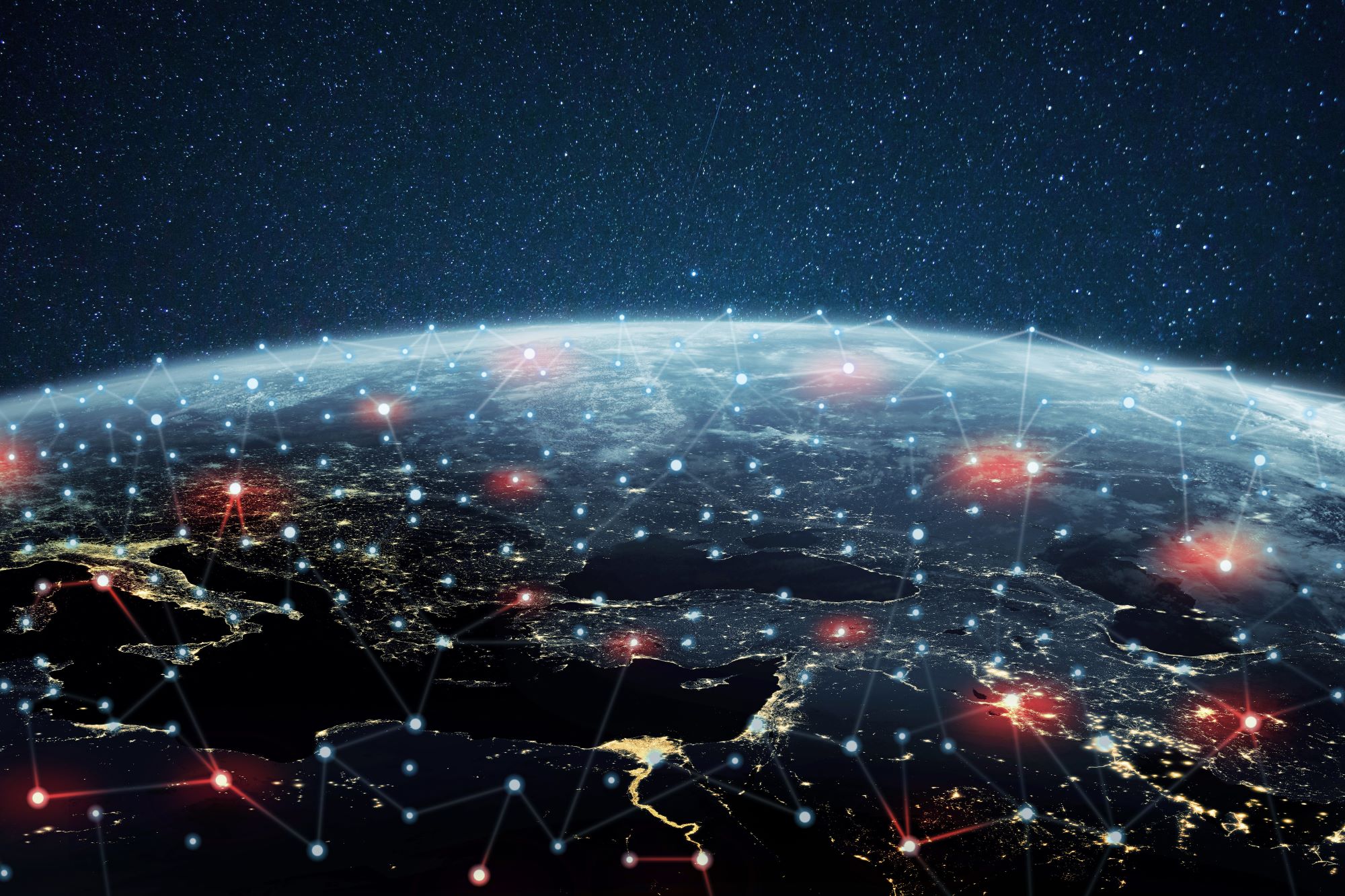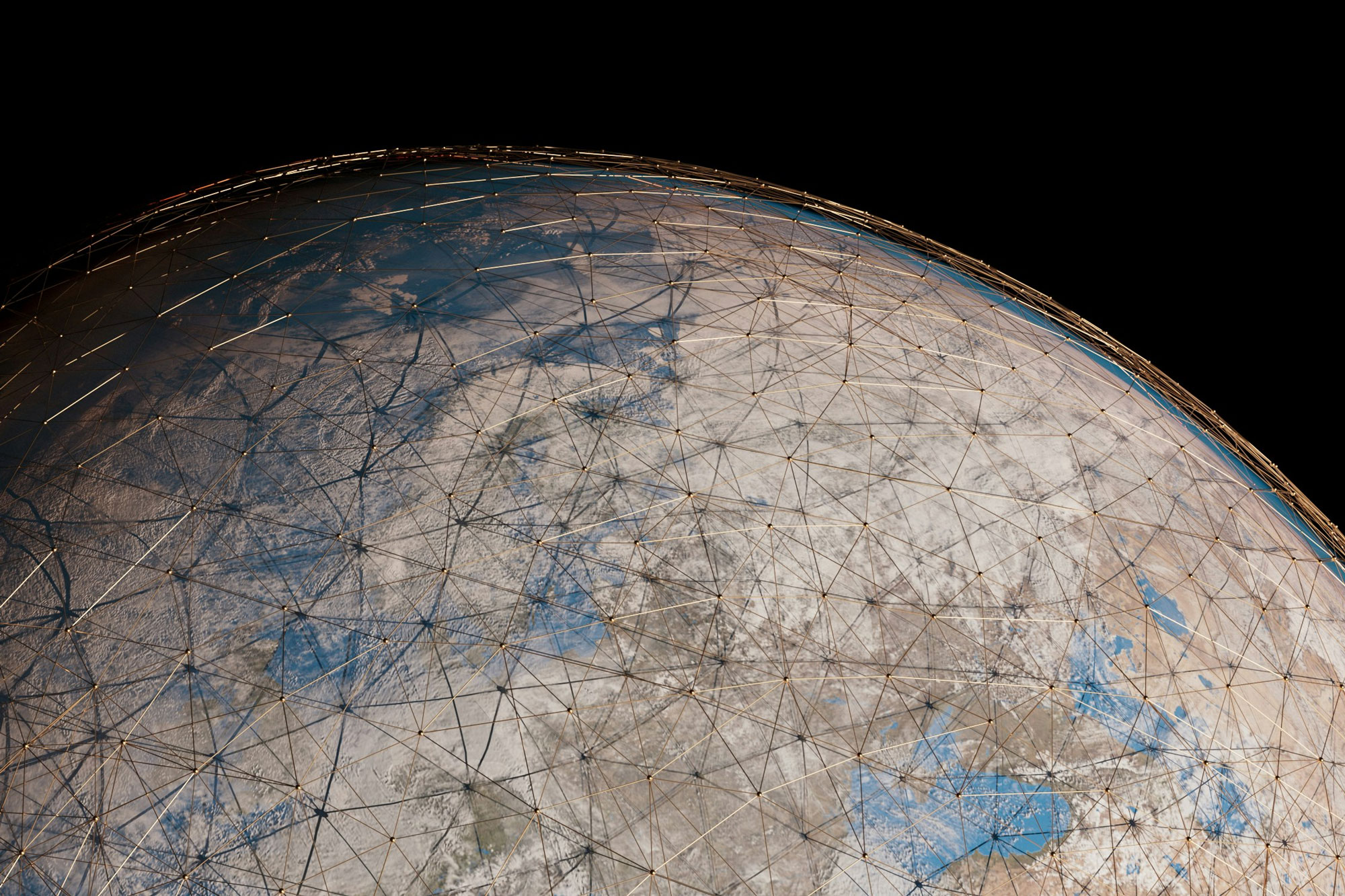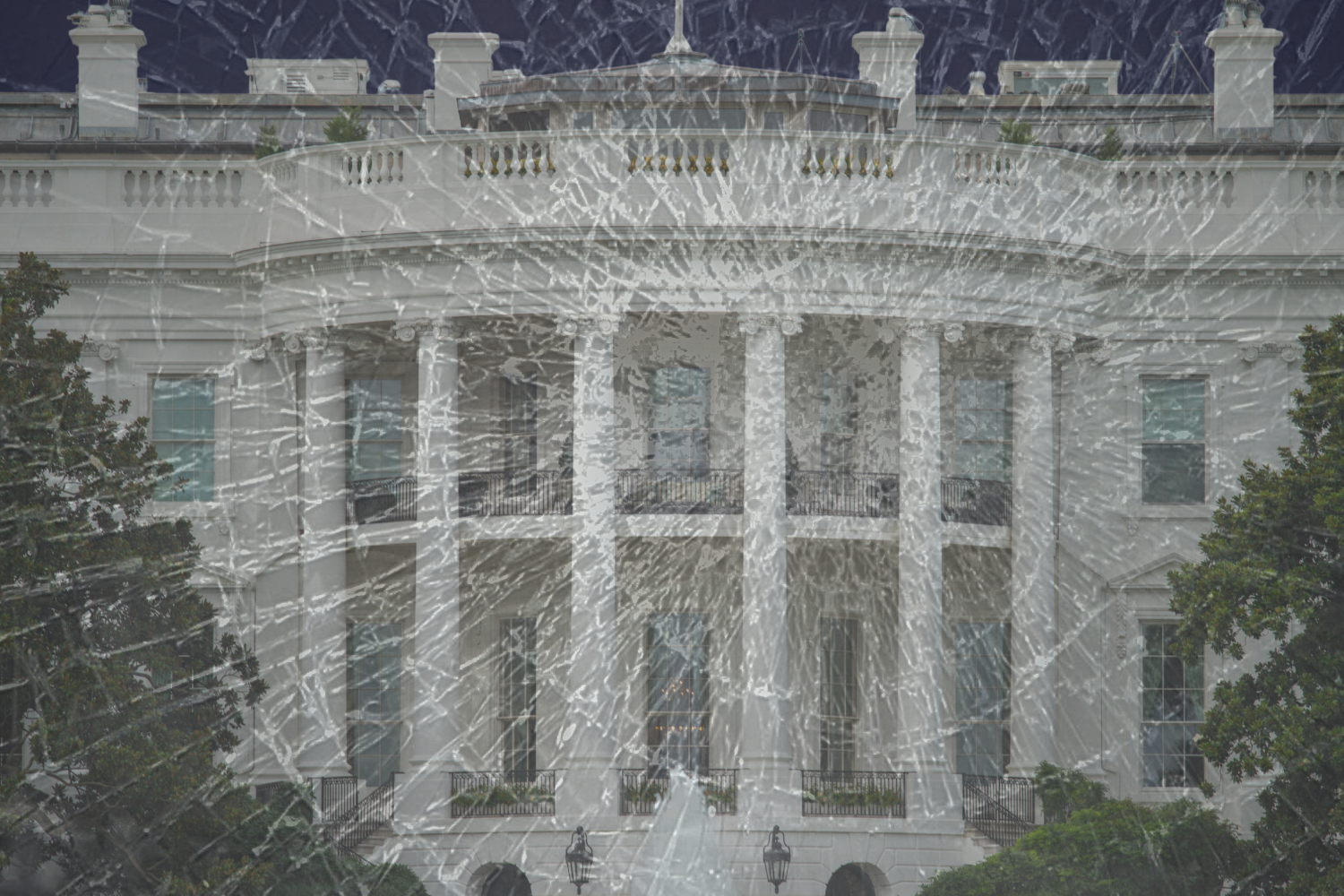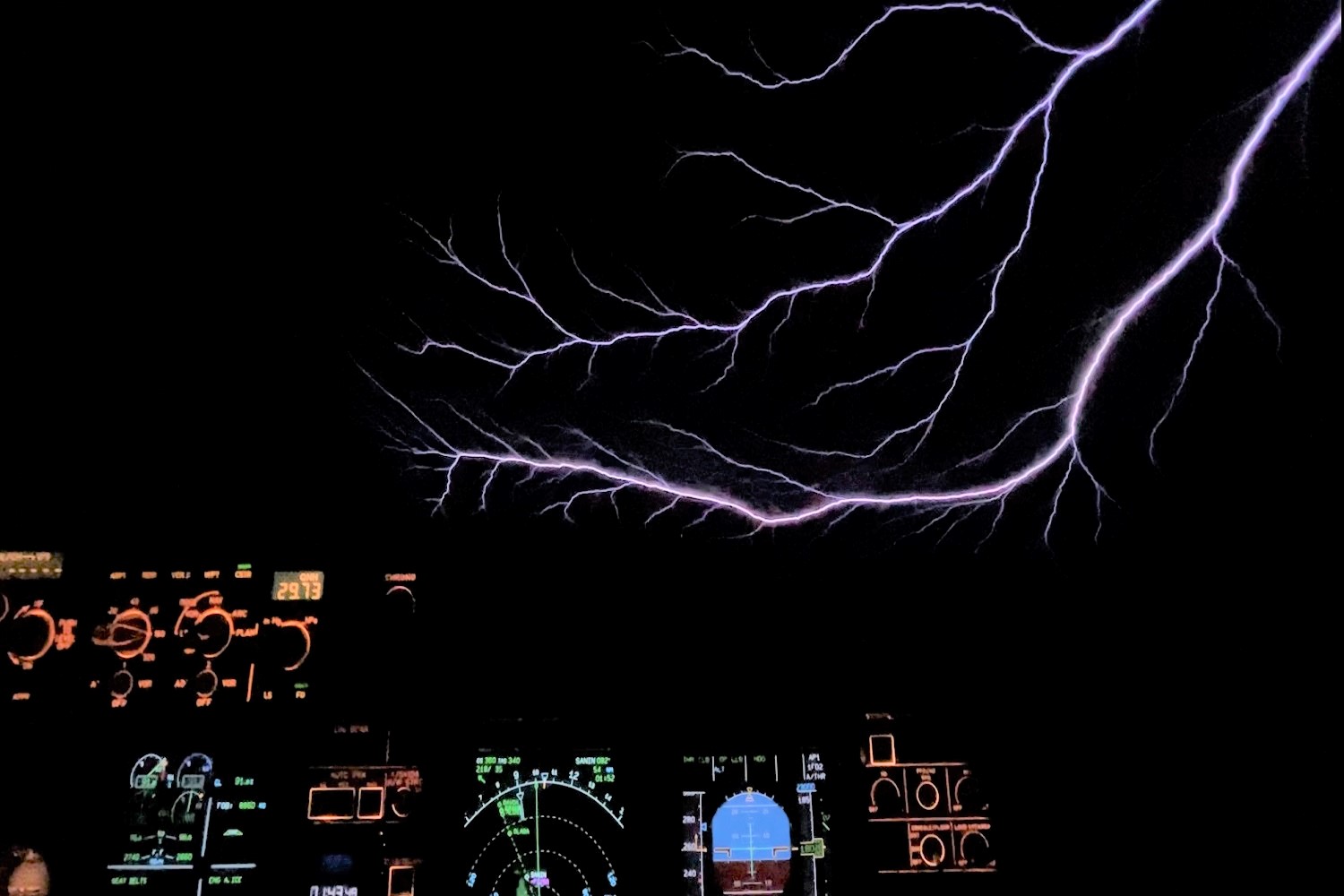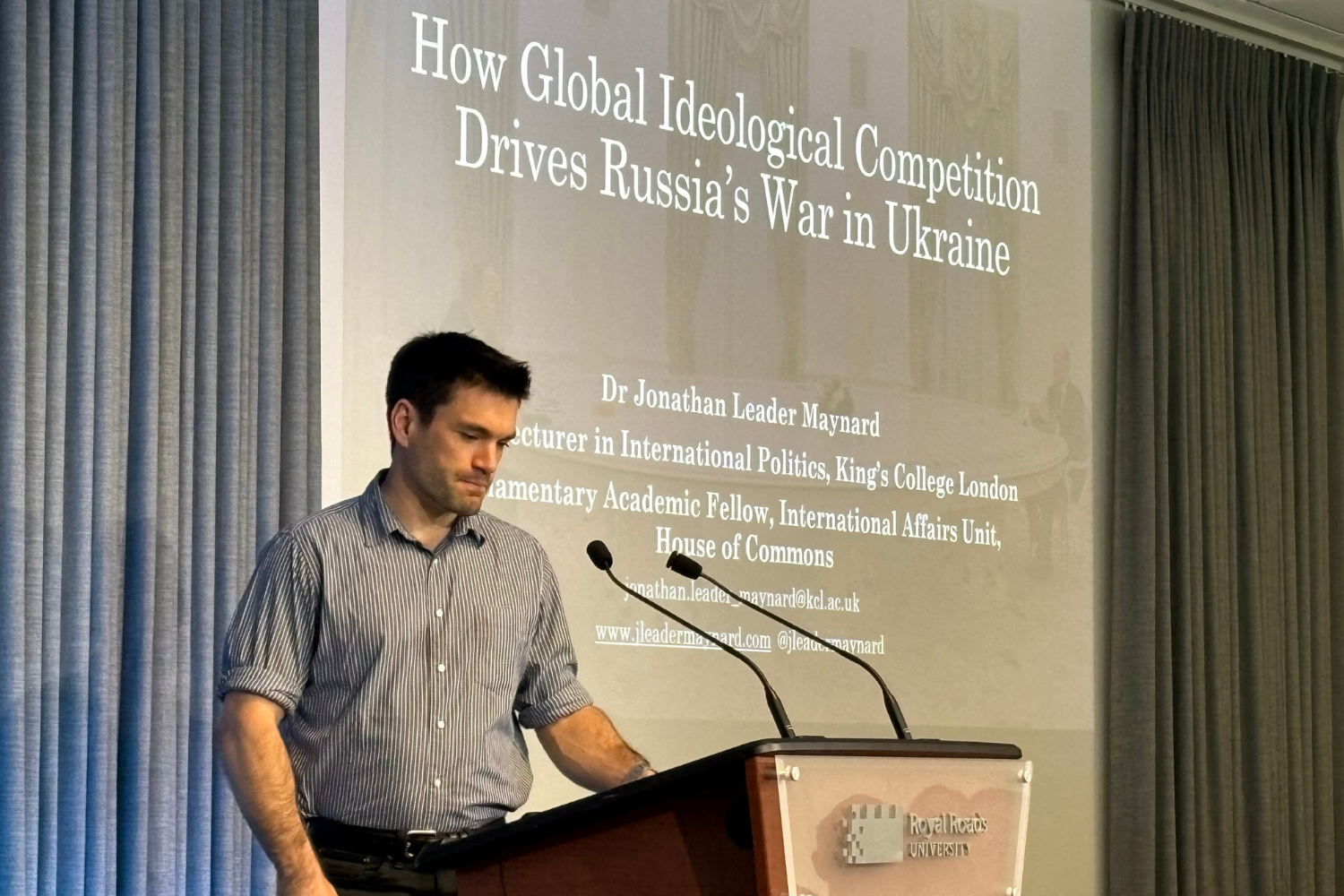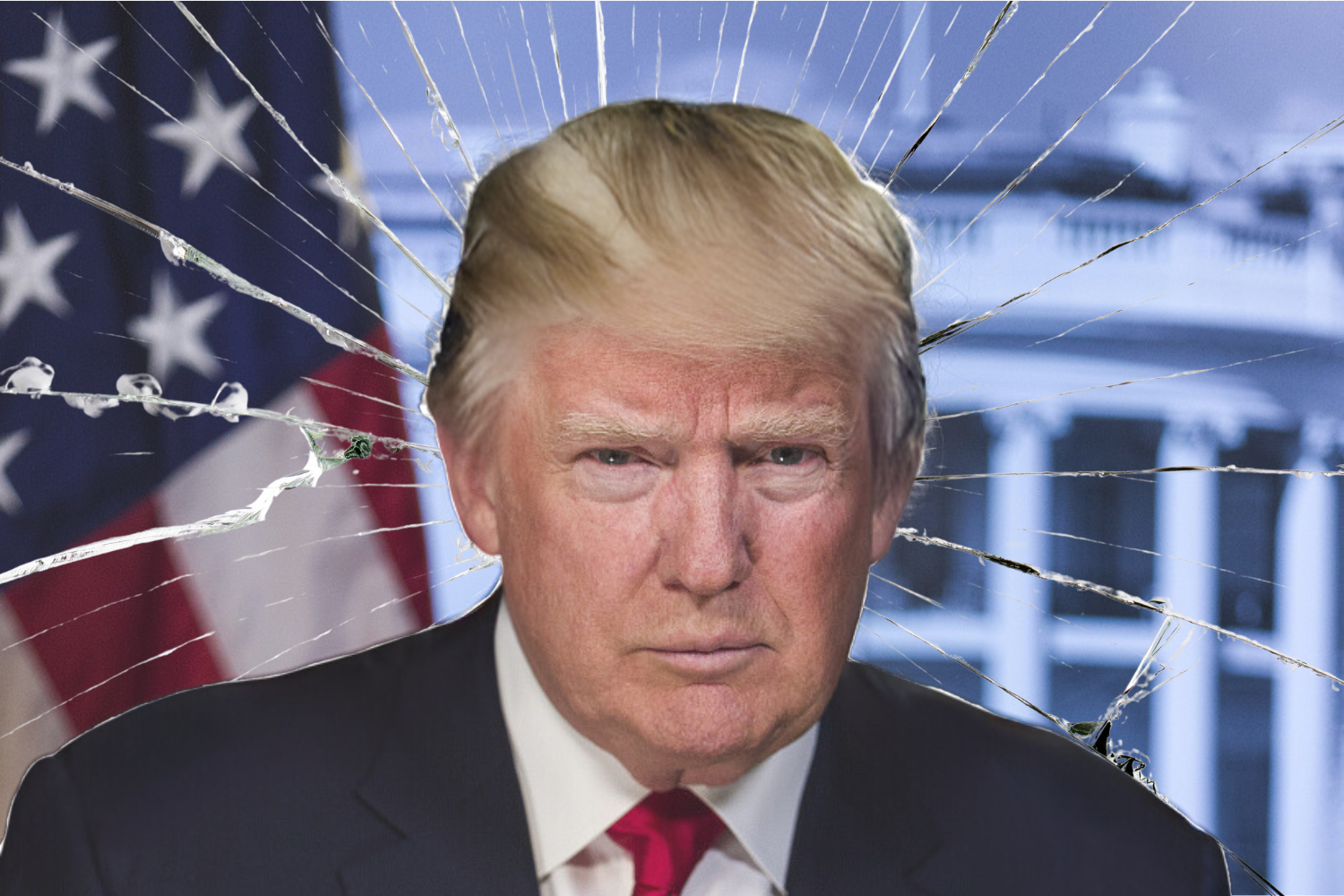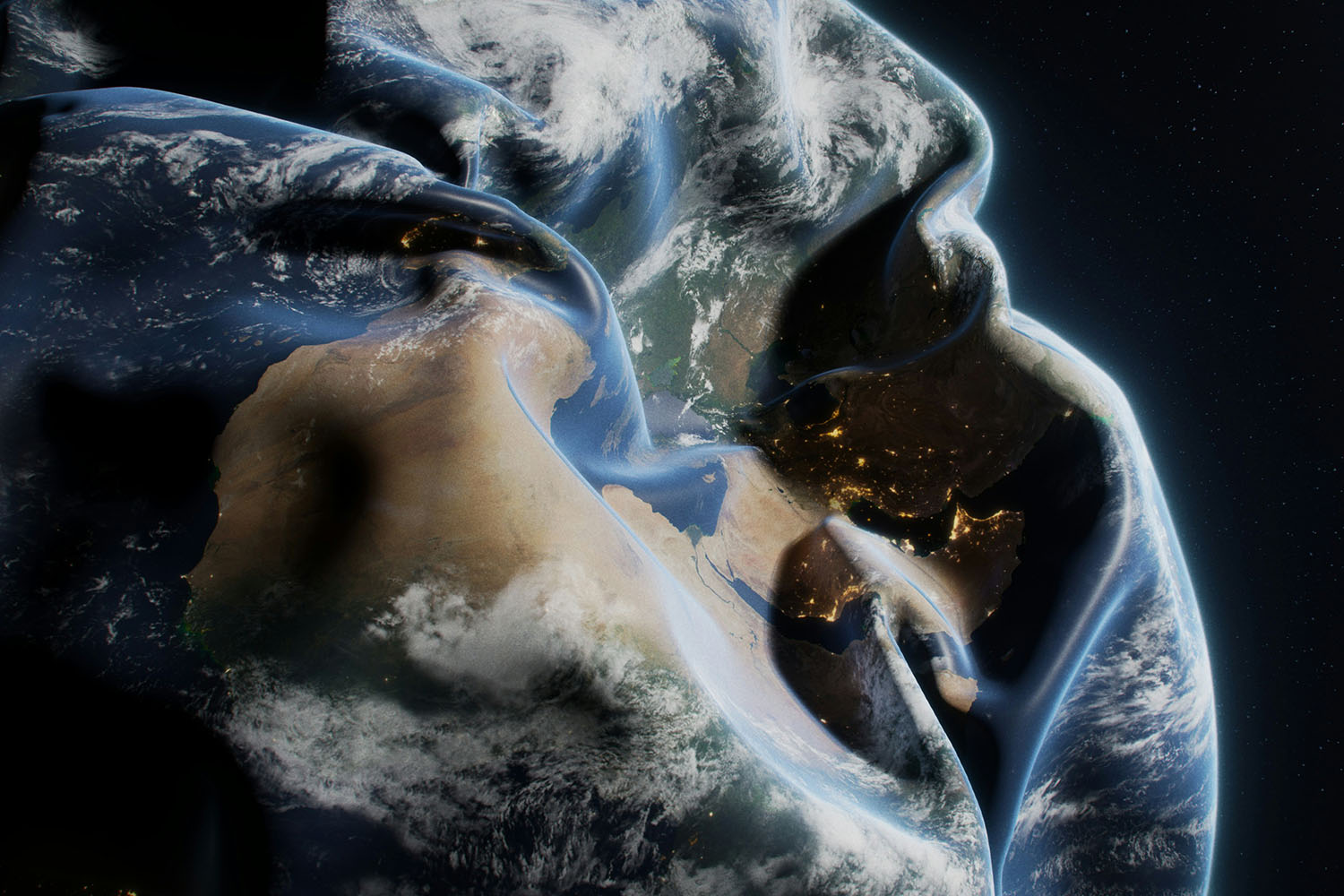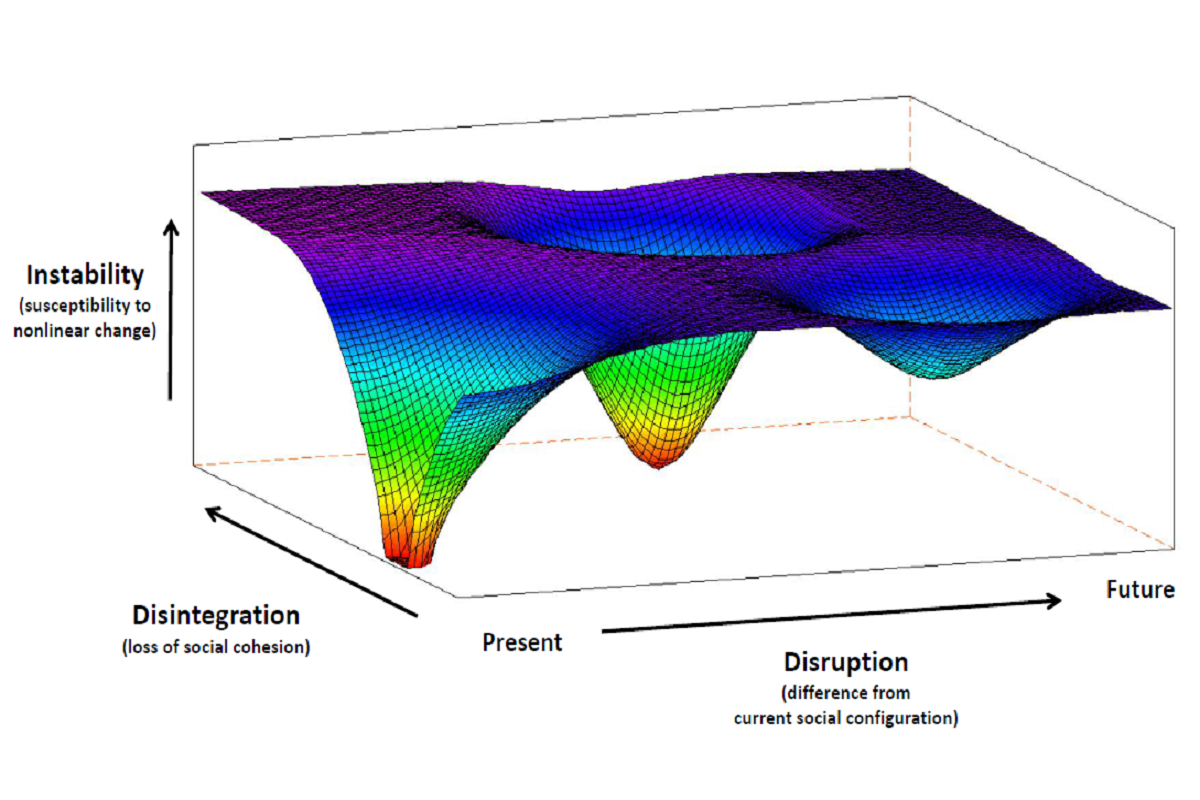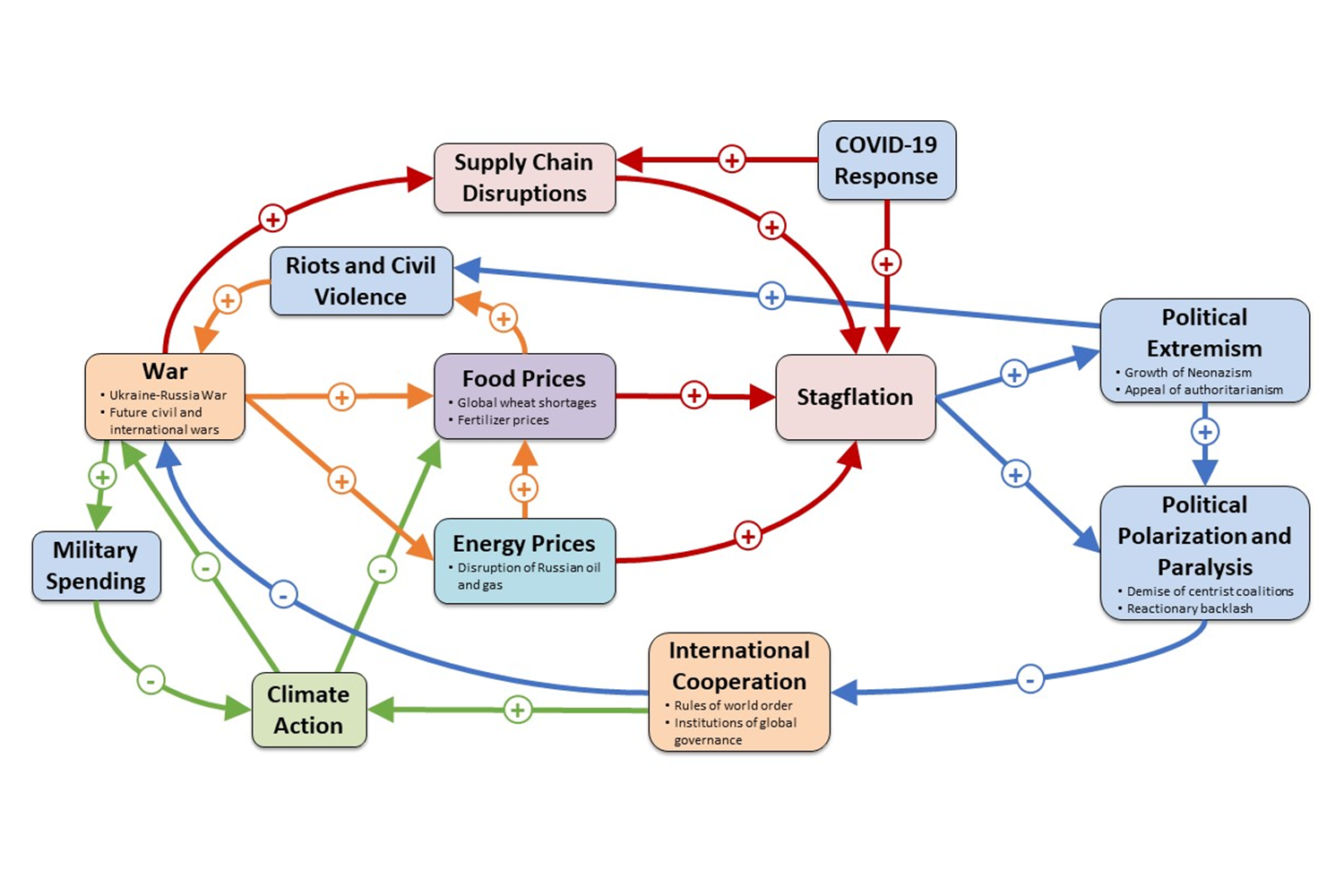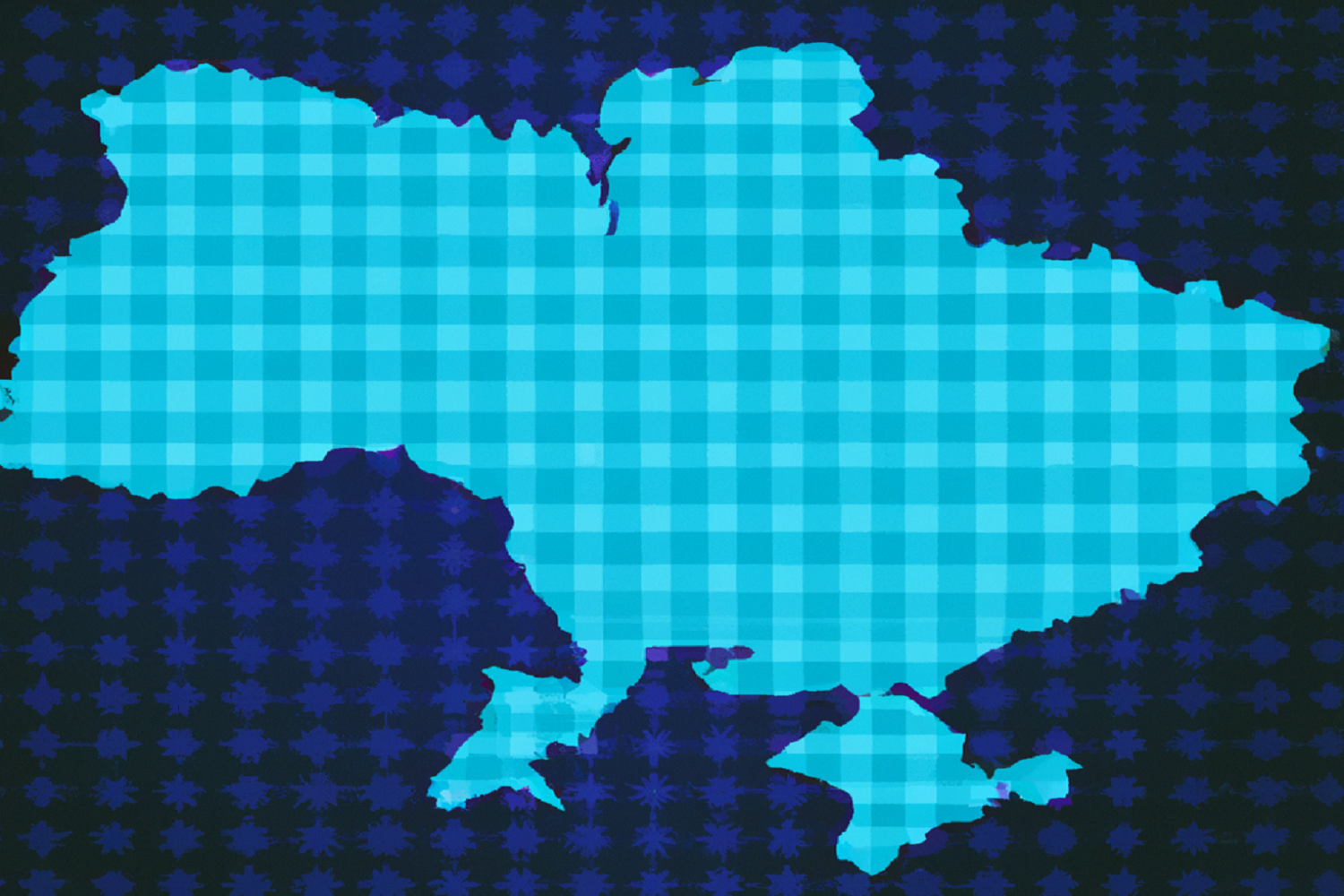POLYCRISIS CORE MODEL

The Cascade Institute's Polycrisis Core Model is a systems mapping tool designed to explore plausible futures for the planet in 2040.
The Polycrisis Core Model offers a roadmap through complexity. By revealing how different global systems interact, it enables targeted strategies that support resilience, equity, and long-term well-being—rather than reactive, piecemeal responses.
The model explores potential scenarios for global systems in 2040, emphasizing the deep interconnections between them. By examining how future states of one system influence others, it identifies combinations of system conditions that are mutually reinforcing within the broader “system of global systems.” The core premise is that the future state of each global system both enables and limits the possibilities for others—a dynamic often overlooked in conventional forecasting approaches.
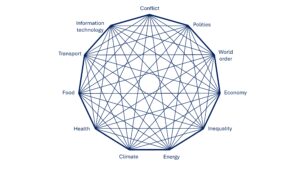
Using a method called cross-impact balance analysis, the Polycrisis Core Model identifies “consistent scenarios”: stable patterns the global system could settle into, whether positive or catastrophic.
The project also aims to democratize futures thinking by creating an open, modifiable base model for use by other research groups and communities around the world.
Dr. Thomas (Tad) Homer-Dixon
Dr. Thomas Homer-Dixon’s research focuses on threats to global security in the 21st century, including economic instability, climate change, and energy scarcity. He also studies how people, organizations, and societies can better resolve their conflicts and innovate in response to complex problems. He holds a PhD from MIT in international relations, defense and arms control policy, and conflict theory.
Dr. Megan Shipman
Dr. Megan Shipman is a Fellow with the Polycrisis program. Her expertise in neural circuitry, complex behaviour, and biomedical science informs her current research on global health systems and their interactions with global crises. She holds a PhD in neuroscience from the University of Vermont.
Dr. Michael Lawrence
Dr. Michael Lawrence is a Fellow with the Polycrisis program. He uses complexity science to understand the coevolution of conflict, violence, and social structure, and through this work he has developed expertise on global governance, societal collapse, the psychology of dehumanization, transnational organized crime, and peacebuilding. He holds a PhD in Global Governance from the University of Waterloo.
Dr. Simone Philpot
Dr. Simone Philpot is a Fellow with the Polycrisis program. She combines systems modeling with qualitative research, focusing on conflict modeling and decision analysis. She has previously applied her expertise to water resources management, aggregate mining, and marine shipping. She holds a PhD in Geography and Environmental Management, from the University of Waterloo.
Dr. Luke Kemp
Dr. Luke Kemp is affiliated with the Polycrisis program. He is a Research Affiliate at the Centre for the Study of Existential Risk (CSER) at the University of Cambridge where he researches the history and future of extreme global risk. His research has been covered by media outlets such as the New York Times, the BBC and the New Yorker. He holds a PhD in International Relations from the Australian National University.
Dr. Scott Janzwood
Dr. Scott Janzwood leads the development and management of the Cascade Institute's research projects. His research focuses on how scientists and policymakers communicate uncertainty and collaborate to address global catastrophic risks, such as climate change, pandemics, and other emerging threats. Scott holds a PhD in Global Governance from the University of Waterloo.
Polycrisis Research & Analysis
Global Systemic Stresses: Understanding the drivers of polycrisis
Polycrisis program
Michael Lawrence, Megan Shipman, and Chris Collins
A Global Risk Institute research report of the longer-term systemic stresses driving the polycrisis.Global polycrisis: The causal mechanisms of crisis entanglement
Michael Lawrence, Thomas Homer-Dixon, Scott Janzwood, Johan Rockström, Ortwin Renn, and Jonathan F. Donges
A peer-reviewed paper, published in Cambridge University Press's Global Sustainability journal, which defines the concept of global polycrisis and provides a theoretical framework to explain causal mechanisms currently entangling many of the world’s crises.Impact 2024: How Donald Trump’s reelection could amplify global inter-systemic risk
Thomas Homer-Dixon, Michael Lawrence, Megan Shipman, Luke Kemp
A technical paper assessing how a second Trump administration could supercharge global political, economic, geopolitical, environmental, and pandemic risks and how those risks could combine to exacerbate the global polycrisis.Polycrisis Research and Action Roadmap
Michael Lawrence, Megan Shipman, Scott Janzwood, Constantin Arnscheidt, Jonathan Donges, Thomas Homer-Dixon, Christian Otto, Pia-Johanna Schweizer, Nico Wunderling
This report offers a concise yet comprehensive snapshot of the emerging field of polycrisis analysis, including gaps, opportunities, and potential priorities.Positive Pathways through Polycrisis
Michael Lawrence and Megan Shipman
A report exploring how polycrisis analysis can help us navigate through polycrisis and pursue "positive pathways" to better futures.Causal Loop Diagrams Handbook
Introduction to Polycrisis Analysis
Michael Lawrence, Megan Shipman, and Thomas Homer-Dixon
An introduction to Cascade Institute’s framework for polycrisis analysis, intended to help governments, firms, and communities assess global risks and respond to emerging threats more effectively.What is a global polycrisis?
Michael Lawrence, Scott Janzwood, and Thomas Homer-Dixon
A discussion paper that argues that the concept of “global polycrisis” provides a useful framework with which to understand and address major problems afflicting humanity today.A call for an international research program on the risk of a global polycrisis
Thomas Homer-Dixon, Ortwin Renn, Johan Rockström, Jonathan F. Donges, and Scott Janzwood
A paper calling for a research program to investigate this moment’s seemingly sharp amplification, acceleration, and synchronization of systemic risks.Max – a thought experiment: Could AI run the economy better than markets?
Edward A. (Ted) Parson
This paper explores how recent advances in AI have re-opened questions around the feasibility and desirability of central economic planning. It presents a thought experiment about how an AI-directed economy might work, based on a powerful AI agent (whimsically named “Max”).Polycrisis News & Views
Canada must consider the risk of U.S. coercion
Thomas Homer-Dixon and Adam Gordon
The Globe and Mail
Canadians must confront the new reality that the U.S. could use military coercion against Canada, argues a Globe and Mail op-ed co-authored by Cascade Institute Executive Director Thomas Homer-Dixon and Adam Gordon, an affiliated Cascade researcher and former legal adviser to Canada’s Minister of Foreign Affairs.
Welcome to the Polycene
Thomas Friedman
The New York Times
The Polycene, Friedman writes, “will be the first era in which humanity must govern, innovate, collaborate and coexist at a planetary scale in order to thrive.”
Crisis and resilience: An interview with Thomas Homer-Dixon
Scott Douglas Jacobsen
Insight Publishing
How complexity science can help us make sense of today’s interconnected global challenges.
AI disruption points to higher taxes on big tech
Christopher Collins and Matt Gerken
Investment Week
AI’s disruption of jobs will spur governments to raise taxes on Big Tech to support displaced workers.
Anti-democratic ‘Dark Enlightenment’ ideas have spread from Silicon Valley to Washington
Christopher Collins
The Globe and Mail
A spotlight on the growing influence of the anti-democratic 'Dark Enlightenment' philosophy among U.S. tech and political elites and its potential consequences for Canada.
If you want peace, prepare for war—an ancient lesson Canada must remember
Thomas Homer-Dixon
The Globe and Mail
President Trump's threats to Canadian sovereignty demand a serious response.
Governing in a complex world series: Explaining the global polycrisis
Thomas Homer-Dixon
Canada School of Public Service
The impacts of a global polycrisis on governance systems and the Government of Canada.
Understanding the ideological drivers of Russia’s war in Ukraine
Jonathan Leader Maynard
Cascade Institute Speaker Series
The critical role of ideology in Russia's war against Ukraine.
Trump Redux: Why the returning president is likely to become one of history’s most consequential figures
Thomas Homer-Dixon
The Globe and Mail
As “reconfigurer-in-chief," Donald Trump will be a world-historical figure.
Can we prevent Trump 2.0 from spiralling into catastrophe?
Megan Shipman and Michael Lawrence
The Globe and Mail
Donald Trump could activate vicious cycles in global systems and propel calamities that long outlive his second term.
Why so much is going wrong at the same time
Thomas Homer-Dixon
Vox
The world is in a polycrisis generated by novel and unprecedented conditions.
Getting to enough
Presentation by Thomas Homer-Dixon
A graphical illustration of the dilemma that's destroying our world—and how we're going to solve it.A hub for the growing polycrisis community
Megan Shipman and Scott Janzwood
Polycrisis program announcement
Polycrisis.org: A hub for a the polycrisis community to converge on priorities for research and action.
Mapping the global systemic consequences of the Ukraine-Russia war
Systems map by Michael Lawrence
A systems diagram charting the knock-on effects of the Ukraine-Russia War — and the vicious cycles that are emerging from them.What happens when a cascade of crises collide?
Thomas Homer-Dixon and Johan Rockström
The New York Times
Today’s mess is best understood as a global polycrisis—a term which implies that humanity is dealing with a complex knot of seemingly distinct but actually deeply entangled crises.
Instead of lurching from one catastrophe to the next, B.C. needs to understand how its crises are linked
Thomas Homer-Dixon and Robin Cox
The Globe and Mail
We need to improve how we marshal, integrate, apply and communicate the best knowledge about B.C.’s emerging risks – those known and anticipated, as well as those unexpected and even currently unimaginable.
The global systemic consequences of the Ukraine-Russia War: Part I
Cascade Institute
Ukraine-Russia War Expert Panel
The first briefing of the Ukraine-Russia War Expert Panel
Polycrisis News & Views
Canada must consider the risk of U.S. coercion
Thomas Homer-Dixon and Adam Gordon
The Globe and Mail
Canadians must confront the new reality that the U.S. could use military coercion against Canada, argues a Globe and Mail op-ed co-authored by Cascade Institute Executive Director Thomas Homer-Dixon and Adam Gordon, an affiliated Cascade researcher and former legal adviser to Canada’s Minister of Foreign Affairs.
Welcome to the Polycene
Thomas Friedman
The New York Times
The Polycene, Friedman writes, “will be the first era in which humanity must govern, innovate, collaborate and coexist at a planetary scale in order to thrive.”
Crisis and resilience: An interview with Thomas Homer-Dixon
Scott Douglas Jacobsen
Insight Publishing
How complexity science can help us make sense of today’s interconnected global challenges.
AI disruption points to higher taxes on big tech
Christopher Collins and Matt Gerken
Investment Week
AI’s disruption of jobs will spur governments to raise taxes on Big Tech to support displaced workers.
Anti-democratic ‘Dark Enlightenment’ ideas have spread from Silicon Valley to Washington
Christopher Collins
The Globe and Mail
A spotlight on the growing influence of the anti-democratic 'Dark Enlightenment' philosophy among U.S. tech and political elites and its potential consequences for Canada.
If you want peace, prepare for war—an ancient lesson Canada must remember
Thomas Homer-Dixon
The Globe and Mail
President Trump's threats to Canadian sovereignty demand a serious response.
Governing in a complex world series: Explaining the global polycrisis
Thomas Homer-Dixon
Canada School of Public Service
The impacts of a global polycrisis on governance systems and the Government of Canada.
Understanding the ideological drivers of Russia’s war in Ukraine
Jonathan Leader Maynard
Cascade Institute Speaker Series
The critical role of ideology in Russia's war against Ukraine.
Trump Redux: Why the returning president is likely to become one of history’s most consequential figures
Thomas Homer-Dixon
The Globe and Mail
As “reconfigurer-in-chief," Donald Trump will be a world-historical figure.
Can we prevent Trump 2.0 from spiralling into catastrophe?
Megan Shipman and Michael Lawrence
The Globe and Mail
Donald Trump could activate vicious cycles in global systems and propel calamities that long outlive his second term.
Why so much is going wrong at the same time
Thomas Homer-Dixon
Vox
The world is in a polycrisis generated by novel and unprecedented conditions.
Getting to enough
Presentation by Thomas Homer-Dixon
A graphical illustration of the dilemma that's destroying our world—and how we're going to solve it.A hub for the growing polycrisis community
Megan Shipman and Scott Janzwood
Polycrisis program announcement
Polycrisis.org: A hub for a the polycrisis community to converge on priorities for research and action.
Mapping the global systemic consequences of the Ukraine-Russia war
Systems map by Michael Lawrence
A systems diagram charting the knock-on effects of the Ukraine-Russia War — and the vicious cycles that are emerging from them.What happens when a cascade of crises collide?
Thomas Homer-Dixon and Johan Rockström
The New York Times
Today’s mess is best understood as a global polycrisis—a term which implies that humanity is dealing with a complex knot of seemingly distinct but actually deeply entangled crises.
Instead of lurching from one catastrophe to the next, B.C. needs to understand how its crises are linked
Thomas Homer-Dixon and Robin Cox
The Globe and Mail
We need to improve how we marshal, integrate, apply and communicate the best knowledge about B.C.’s emerging risks – those known and anticipated, as well as those unexpected and even currently unimaginable.
The global systemic consequences of the Ukraine-Russia War: Part I
Cascade Institute
Ukraine-Russia War Expert Panel
The first briefing of the Ukraine-Russia War Expert Panel


